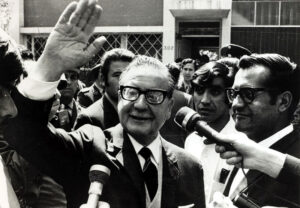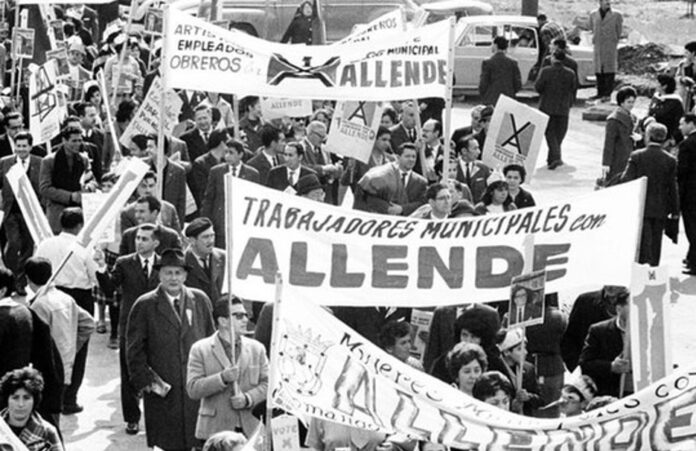“We (Chile) are moving towards socialism, not from an academic love for a doctrinaire system, but encouraged by the strength of our people, who know that it is an inescapable demand if we are to overcome backwardness and who feel that a socialist regime is the only way available to modern nations who want to build rationally in freedom, independence, and dignity.
We are moving towards socialism because the people, through their vote, have freely rejected capitalism as a system which has resulted in a crudely unequal society, a society deformed by social injustice and degraded by the deterioration of the very foundations of human solidarity.” – Salvador Allende
On 11 September 1970, General Augusto Pinochet led a military coup leading to nearly a decade of military rule in Chile. This date marks the beginning of the global neo-liberal era, where governments across the world began to move to establish strong authoritarian governments adopting market-led policies against the interests of the people.

On that day, Salvador Guillermo Allende Gossens, then President of Chile, died. His death was caused by suicide, a gunshot to the head. This was followed by a month of largescale murder and imprisonments of supporters of Allende and other leftists. The new military government held power for nearly a decade, destroying movements that evolved over decades before. On leaving power, Pinochet established a constitution that would enforce the neo-liberal governing structure he built for decades to come.
Allende’s government was the first in the world to chart a path to socialism using parliamentary means. In the few years it held power, despite horrible economic challenges, it remained popular. The military coup that followed became a symbol to all countries of how they would be punished if they decided to consider socialism in the future.
3. Rise of Anti-Capitalism in Chile
In 1929, a global financial crisis, known as the Great Depression, sent shockwaves through Latin American. The depression led to a near-collapse of the mining sector in Chile, which affected all parts of the economy. At the same time, a growing consciousness in the workers let to anti-capitalist movements taking off, including Marxist, Leninists, anarchists, Mapuche (indigenous), and feminist movements. While the economy suffered, this was also a time where Chile began to stabilize its civilian government, which up until then had been teetering on military rule.
In 1933, Salvador Guillermo Allende Gossens, a physician who had been influenced by leftist thought, co-founded the Socialist Party of Chile. The movements of the time led to the nationalisation of major industries and the establishment of critical labour reforms.
Starting from the 1950s, Chile saw a right-wing swing in its politics. The extreme right-wing fell out of the political landscape after World War II, but conservative Christian factions began to gain strength. The American government played a role in this swing, financially supporting the right-wing parties and promoting propaganda campaigns in Chile. American involvement intensified after the Cuban revolution in 1959.
In this period, Allende grew as a Presidential Candidate for the Left-Wing Coalition. Though he barely received 5% of the popular vote in his first bid, subsequent bids made impressive gains, getting nearly 30% of the popular vote in subsequent elections. He finally won in 1970 with support from the Christian Democratic Party giving his coalition enough to win.
Allende kept close ties with the Communist Party of Chile. The CPC’s presidential candidate, famed poet Pablo Neruda, supported Allende’s bid and served as a diplomat under Allende’s government.
“The nationalisation of our copper is not an act of vengeance or hatred directed towards any group, government or nation. We are, on the contrary, positively exercising an inalienable right on behalf of a sovereign people – that of the full enjoyment of our national resources exploited by our national labour and effort.”– Allende
Allende’s rise was seen as a threat to America’s hegemony in Latin America. Though technically not part of the Communist Party of Chile, Allende’s was the first socialist government that could take power in the American continents through parliamentary means. Even more threatening, Allende advocated policies that went against American business interests.
























[…] Related: The first 9/11: How the Parliamentary Path to Socialism in Chile was Crushed […]